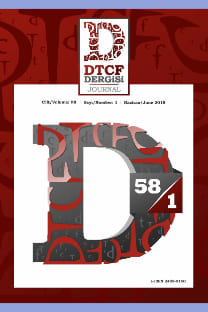HÉLÈNE CIXOUS'NUN SI PRÈS BAŞLIKLI YAPITINDA SUÇLULUK DUYGUSU VE VİCDANİ SORUMLULUK
Hélène Cixous'nun 2007 yılında yayımlanan Si près başlıklı yapıtı, Yahudi kökenli Fransız yazarın, 1930'lu yıllardan 1960'lara uzanan süreçteki Cezayir deneyimini aktarır. Tarihsel olarak İkinci Dünya Savaşı ve Vichy dönemi sömürge Cezayir'ine ve devamında Cezayir Bağımsızlık Savaşı'na uzanan anlatı, bu bağlamda, yazarın söz konusu döneme dair iç hesaplaşmasını ortaya koyar. Kökenleri ve dönemin siyasal koşulları nedeniyle hem kurban hem de fail olan yazar, anlatısında bir yandan maruz kaldığı ayrımcılığı, diğer yandan da sahip olduğu kimlikler nedeniyle, Cezayir konusunda taşıdığını düşündüğü dolaylı sorumluluğunu yazıya döker. Söz konusu sorgulama, düşünsel olarak, biri yazarın annesi Ève Cixous diğeri Cezayir Bağımsızlık Savaşı'nın önemli gürlerinden olan Zohra Drif aracılığıyla temsil edilen iki taraf – sömürgeci ve sömürülen - arasına konumlanan anlatıcının, 1955 yılında terk ettiği Cezayir'e dönüş düşüncesi etrafında biçimlenir. Anlatıcının hem bağışlama hem de bağışlanma arzusu üzerine kurulu bu sürecin anlatımında, adaletin ve gerçeğin yazı aracılığıyla yeniden oluşturulması amacı ön plana çıkar. Dolayısıyla anlatı, Cixous'nun Cezayir geçmişini ve savunduğu yazın anlayışı doğrultusunda yazının üstlendiği sorumluluğu ortaya koyar. Bu çalışmada, Cixous'nun kuramsal yapıtlarında yer alan yazı eylemine yaklaşımı ve kurgusal yapıtlarında yer alan özyaşamöyküsel öğeler bir araya getirilerek, yazarın kurgusal gerçeklik üzerinden suçluluk duygusu ve vicdani sorumluk kavramları doğrultusunda oluşturduğu duyarlılık ve çok yönlü, yapıcı bakış açısı incelenecektir.
SENSE OF GUILT AND CONSCIENTIOUS RESPONSIBILITY IN SI PRÈS BY HÉLÈNE CIXOUS
The work titled Si près by Hélène Cixous, which was published in 2007, narrates the Algerian experience of the Jewish French author from the 1930s to the 1960s. Historically, the narrative, which extends to The Second World War and colonial Algeria in Vichy period and then to the Algerian War of Independence, reveals the internal feud of the author about the period in this context. In her narrative, the author, who is both the victim and the perpetrator because of her origins and political conditions of the period, writes about the discrimination she was subjected to and the indirect responsibility that she thinks she feels for Algeria. This questioning is ideationally formed around the narrator's thought of returning to Algeria that she left in 1955; she is positioned between the two parts -colonist and colonised- represented through two characters, one is Ève Cixous, the author's mother and the other is Zohra Drif, one of the signicant gures of Algerian War of Indepence. In the narration of this process, founded on narrator's desire to forgive and to be forgiven, the aim of reinstating justice and truth through writing comes into prominence. Therefore, the narrative reveals Cixous' Algerian history and the responsibility the writing takes in line with the literary understanding she defends. In this study, sensitivity and multiple, constructive perspective that Cixous creates in line with the concepts of feeling of guilt and conscientious responsibility through ctional reality is examined in the light of her approach to writing in her theoretical works and the autobiographical elements in her ctional works.
___
- Boyer-Weinmann, Martine. “Donner forme aux impossibilités biographiques: Hélène Cixous et Günter Grass.” Les nouvelles écritures biographiques: La biographie d’écrivain dans ses reformulations contemporaines. Ed. Robert,Dion et Frédéric Regard. Lyon: ENS Éditions, 2013. Web. 04.01.2019.
- Calle-Gruber, Mireille, Hélène Cixous. Hélène Cixous, Photos de Racines. Paris: Éditions des femmes-Antoinette Fouque, 1994.
- Cixous, Hélène. Le Rire de la Méduse et autres ironies. Paris: Galilée, 2010.
- Cixous, Hélène. Si près. Paris: Galilée, 2007.
- Cixous, Hélène. “Lettre à Zohra Drif.” Lectora: revista de dones i textualitat 7 (2001): 183-188. Web. 04.01.2019.
- Cixous, Hélène. “Pieds nus.” Enfance Algérienne. Ed. Leïla Sebbar. Paris: Gallimard, 1997. 55-63.
- Cixous, Hélène. “En Octobre 1991.” Du Féminin, Ed. Mireille Calle. Grenoble: Presses Universitaires de Grenoble, 1992. 117-137.
- Cixous, Hélène, Frédéric-Yves Jeannet. Rencontre terrestre. Paris: Galilée, 2005. Lie, Sissel. “L’Image de l’Artiste – Hélène Cixous.” Hélène Cixous, croisées d’une oeuvre. Ed. Mireille Calle-Gruber. Paris: Galilée, 2000. 207-213.
- Penrod, Lynn. “Algeriance, Exile, and Hélène Cixous.” College Literature 30.1 (2003): 135-143.
